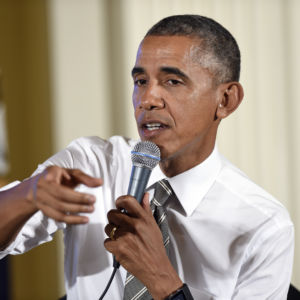Want a real-time example of a conundrum? Examine the polarity between President Barack Obama and some members of the Muslim community.
The subject: religious vernacular.
During a most enlightening panel discussion titled “Muslim Voices Against the Islamic State and Islamist Extremism,” held last week at the conservative Heritage Foundation, a group of pro-democracy Muslim professionals offered their opinions on ideology, tolerance and customs.
As one panelist proclaimed, they are “in the trenches in a battle for the soul of Islam.”
One segment of the fascinating, two-hour discussion focused on these key terms: “radical Islam,” “Muslim fundamentalists,” “Islamic jihadists” and “Islamic extremists” and other like derivatives. We all have been inundated with this acrimonious tug-of-war between Obama and Republican leaders regarding the usage of those terms.
Obama adamantly refuses to use those descriptive terms, presumably because he fears a virulent backlash by Americans bent on fostering harmful stereotypes; Republicans, from Arizona Sen. John McCain to presidential candidate Gov. Chris Christie of New Jersey, adamantly say the president should alter his vocabulary.
The concerned, international Muslim panelists on this day explained why Obama is making a monumental mistake, especially in the aftermath of terrorist attacks in Paris and San Bernardino, Calif.
“President Obama simply doesn’t want to embrace reality,” said Farahnaz Ispahani, a former member of the Pakistani Parliament and author of the coming book, “Purifying the Land of the Pure: Pakistan’s Religious Minorities.”
She added, “He will not say the words; he will not use the language.”
After the panel discussion, I approached Ispahani and asked her why she so staunchly opposed Obama’s key-word omission. She said if Obama would use such terms as “Islamic extremists,” then “we will be freed.”
To further expound, here’s Ispahani’s point: Implementing a practice using specific terminology would separate progressive Muslims from the radical fundamentalist segment.
I asked her, “Therefore, you would feel a sense of liberation?” Ispahani replied, “Yes.”
So, why won’t President Obama change his reasoning? “I can’t get inside the president’s head,” she said.
Remember that word “conundrum” from the first sentence. Now, you see the broader perspective of Muslim reformers and heretics who don’t advocate literal interpretations of the Quran.
In fact, not only did Ispahani seem exasperated with Obama’s word-description policy, she also was clearly perplexed, saying, “We’re the ones who are Muslim; we understand how this will help us.”
Ispahani offered a bit of advice to President Obama: Diversify your Muslim contacts to more than imams, the male leaders of prayer at mosques. “He should meet with Muslim attorneys, doctors, community activists, as well as women and other professionals,” she advised. “Talk to those members of the reformist movement.”
Interestingly enough, on Sunday night, President Obama almost crossed that threshold of voicing the term “Islamic extremism” or its derivatives in his forceful address about terrorism, four days after the San Bernardino tragedy. Obama, in a rare oration from the Oval Office, approached that elusive hurdle of terminology, but he didn’t cross it.
In a passionate speech in which he came the closest to changing his vernacular with his strongest language yet, by far during his seven years as president, Obama said Sunday night:
“If we’re to succeed in defeating terrorism, we must enlist Muslim communities as some of our strongest allies, rather than push them away through suspicion and hate.
“That does not mean denying the fact that an extremist ideology has spread within some Muslim communities. It’s a real problem that Muslims must confront without excuse.”
Contrast those remarks to British Prime Minister David Cameron, who, three days after the Paris attacks, on Nov. 16 during a speech at the annual Lord Mayor’s Banquet in London, said: “Of course, this extremist ideology is not true Islam. That cannot be said clearly enough.
“But it is not good enough to say simply that Islam is a religion of peace and then to deny any connection between the religion of Islam and the extremists.
“Why? Because these extremists are self-identifying as Muslims.”
Bingo.
Therein lies the difference between Obama, other world leaders and reformist Muslims.
The panel of Muslim activists appeared resolute in their mission to champion their noble cause as reformers.
Said Asra Nomani, a former Wall Street Journal reporter who is co-director of the Pearl Project, in memory of former WSJ colleague Daniel Pearl, who was kidnapped by Pakistani militants and subsequently murdered in 2002, “We are in an ideological war.”
A self-professed Muslim feminist from West Virginia who vehemently bucked acute gender bias in mosques and the Quran, Nomani added, “Naming it would protect Muslims more. We want Muslims to own up and take responsibility. We have to name it to tame it.”
Naser Khader, a member of the Parliament in Denmark for the Conservative People’s Party, simplified the message of Muslim reformers: “If we don’t condemn terrorists, people will think we agree with them.”
Dr. M. Zuhdi Jasser, a physician from Arizona who is the founder and president of the American Islamic Forum for Democracy and frequent guest on Fox News Channel talk shows, encapsulated the tenor of Muslim reformers with an abbreviation. He spoke of CVE, a term used by the U.S. Department of Homeland Security that means “Countering Violent Extremism.”
Jasser said add a capital “I” and embrace a reality check: “Countering Violent Islamic Extremism.”

